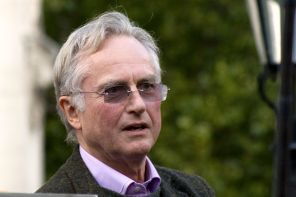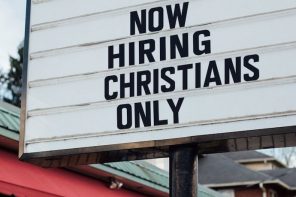Part One of Bernard Schweizer’s essay on James Wood’s God-hating novel is here.
_______________________
How is it possible to at once be furious with God and not believe in Him at all?
The Book Against God chips away at old-fashioned religious identity politics. In doing so, it suggests that we are activating different parts of our identity, especially our religious identity, depending on the context.
For example, in his “public” statements, Wood’s hero, Tom Bunting, comes across as around 80% atheist and 20% agnostic. In his private musings he admits to being “against inherited religion”—a kind of anti-theism. But when it comes to his “Book Against God,” his book-within-the-book, he comes across as stridently God-hating.
Now, some of these positions are not all that incompatible. Many atheists are also enemies of religion (hence, anti-theists)—Christopher Hitchens has identified himself as just such a rebel. It also makes sense to waver between atheism and agnosticism, as Philip Pullman sometimes does in his public statements. But there are less likely combinations of religious non-conformism. It would be incompatible to be, say, an atheist and a Unitarian at the same time. Similarly, the combination of atheism (non-belief) and misotheism (God-hatred) would seem be a very odd couple of religious dissent. To combine both stances simply violates logic.
As I argue in Hating God, one needs to believe in God in order to genuinely hate him. True, atheists may hate the idea of God, but their hatred of the figure of God amounts to something comparable to hating a fictional character, say Iago or the Grinch who stole Christmas. This is not the same as believing in the existence of God while denouncing him as a criminal deity.
“The most vain, the most ferocious…”
Having said this, I must acknowledge that some people do appear to hold in balance both a misotheistic hatred of the “existing” God and a hatred of the mere God idea.
For instance, there is Michael Bakunin who reviled Yahweh as “the most jealous, the most vain, the most ferocious, and the most unjust, the most bloodthirsty, the most despotic [deity],” and yet, Bakunin also acknowledged that “the idea of God implies the abdication of human reason and justice” and that “the religious heaven is nothing but a mirage in which man, exalted by ignorance and faith, discovers his own image.” Similarly, Pierre-Joseph Proudhon brooded that “God is hypocrisy and falsehood; God is tyranny and misery; God is evil” and yet he too refers to the “God idea” or the “hypothesis of God.”
Fast-forward from these nineteenth-century iconoclasts and you get Philip Pullman who keeps reiterating that he is an atheist (successfully so, since everybody agrees with him), and yet he writes one of the misotheistic masterpieces of the late-twentieth century, His Dark Materials. Go figure.
And so I went, and I figured. Literally. The result of my figuring is a diagram that depicts graphically how I conceive of the relationship between Pullman’s or Tom Bunting’s (negative) faith and the non-believer’s hatred of a fictional God idea. (Note that the names above the middle denote actual people while the names below the dividing line stand for fictional characters. The same color code was applied to match an author to his/her fictional creation.)
First, what this diagram shows is a continuum of diminishing intensity of God-hatred from left to center: from rage, to hatred, to anger, to resentment.
And, as we can see, as the intensity of hatred for the “real” God diminishes, it enters a phase where it can coexist with the diminished hatred for a God taken to be merely a figment of the imagination. In other words, mildly misotheistic individuals can have at the same time a tendency to be atheists who have a moderate hatred for the (fictional) God idea.
Note well that not all atheists are disposed to hating a fictional God. Perhaps most of them simply cannot be bothered to resent a collective mental construct, i.e. God.
But it is also true that some of the New Atheists, like Richard Dawkins or Christopher Hitchens, have been very outspoken and passionate in their denunciation of fictional Yahweh’s criminal shortcomings. Their hatred of the God idea seems real, even while they maintain not a shred of belief in the existence of God.
On the left side of the spectrum are individuals like William Blake or Algernon Swinburne whom it would be pointless to convince of God’s non-existence. Their poetry is suffused with religious revolt and reverence of one kind or another. They were haters of a God they truly believed in, i.e. theists with a visceral resentment against Yahweh. These are the God-hating purists.
But in the middle of the continuum there are poets like Shelley, the anarchists Proudhon and Bakunin, our contemporary Philip Pullman, and, it turns out, the fictional Tom Bunting, who do appear to balance belief in a despicable God with hatred of the mere God idea. For such individuals, it appears, the believer’s and the non-believer’s form of God-hatred interpenetrate.
Also, and interestingly, it appears that with one or two exceptions, God-hating characters of fiction are more radically, passionately, and provocatively angry at God than their creators, i.e. the writers themselves.
This brings me to the next important subject: What is the relationship between writers and their fictional creations?
Biographical Fallacy? Rubbish.
First rule of literary criticism: Don’t identify fictional characters with their authors. Amendment: the first rule is suspended till further notice.
To let an author’s life illuminate her work and vice versa is sometimes branded as a “biographical fallacy.” The term implies that biographical information tarnishes the noble autonomy of the literary artifact and should not be taken into account when interpreting a given work. I find this to be nonsense.
After teaching literature to both undergraduate and graduate students for upwards of twenty years, I found that students’ eyes regularly light up and a ripple of understanding goes through the class when I pour a drop or two of biographical info into the test tube filled with literary matter. That’s when reactions often start to happen.
And how could it be otherwise? “The Death of Ivan Ilyich” is strongly, if inversely, related to Leo Tolstoy’s own life and beliefs. Although Ivan Ilyich’s values (chasing after possessions, craving social reputation, seeking career advancement) are pretty much the obverse of Leo Tolstoy’s Christian anarchist outlook, the author is reflected in his character as the mold is in the cast. Talking about Tolstoy not only brings Ilyich into better relief, it also opens new avenues of discussion about religious and political ideologies and their bearing on the story.
And the list of authors’ alter egos goes on: John Cheever’s celebrated short story “The Swimmer” is a take on the author’s own struggles with addiction, down to his preferred intoxicant: gin. The similarities between James Joyce and Stephen Dedalus go beyond their shared hatred of the Catholic Church and disdain for the Irish state. Rebecca West’s character Cordelia (in The Fountain Overflows) is such a thinly-veiled, unflattering rendition of the author’s sister, Leticia, that West felt compelled to patch things up by dedicating the novel to her.
The last example points to the complex (and real) psychological entanglements that occur between authors and characters. Psychological schools of criticism have thrived on such dynamics. But the analyzing tendency of psychological criticism has sometimes been accused of verging on voyeurism, where the author’s secrets are pried from his characters on the critic’s couch.
James Wood comments on this investigative turn in literary criticism:
“the critic as analyst or perhaps as detective interrogates the text for those moments at which the poem seems to be displaying its stresses; when, in effect, it is sweating. These are the moments at which an anxiety is being repressed. Having found these moments, the critic then announces that the real subject of the poem is this very anxiety or the struggle to hide it.”
Wood is wary of this method, but I feel that he may not quite do it justice. After all, authors may deliberately play hide-and-seek with their more sophisticated readers, transferring to their characters some important truths that, for one reason or another, cannot be stated directly. There’s even a good chance that authors actually want to be read biographically. Until recently, the idea of God-hatred was so explosive that to mention it publicly would have risked ruining an author’s career. But carefully packaged as the view of a character, an author could still give vent to his forbidden rage, perhaps in the hope of being found out by the more “discriminating readers.”
Alternatively, authors may simply be conflicted or unsure about certain points of their own belief and use fiction to work through vexing problems. Once again, this struggle may not be evident on the surface of the story or may not even be explicitly “intended” by the author.
And this brings me back to Philip Pullman: My linking of Pullman with misotheism has been greeted with some incredulity. The Washington Post review of my book ended by quipping “I would like to be in the same room when Schweizer tells Pullman that he believes in God.” That’s smart—but not quite smart enough.
It may be presumptuous to tell anybody what he or she believes. But as Pullman has reminded us in his acceptance speech for the Carnegie medal in 2000, “all stories teach.” And if that is so, then one would assume that there is a connection between the author-as-teacher and the story-as-lesson.
In writing one of the greatest stories of misotheism in recent memory (i.e. His Dark Materials), Philip Pullman is teaching his readers that they should look to liberal, secular values to give meaning to their lives and that they should despise deities as the dispensers of morality. By identifying him as a misotheist, all I’m doing is holding Pullman-the-teacher accountable for the contents of his own lesson.
Referring back to the diagram introduced above, it becomes quite obvious that authors do in fact tend to dramatize their private beliefs in the lives of their characters. If you look to the evidence—private letters, diaries, unpublished drafts—it’s often clear that the authors who write misotheistic stories share this negative view of divinity, whether or not they openly and publicly own up to it.
A Mild Case of Misotheism
The relevance of all this for our novel under discussion, James Wood’s Book Against God, begins to come into focus now.
To recap: the central character of this story, Tom Bunting, is a closeted misotheist (who may not be fully cognizant of the fact that other people share his hatred of God), whose “official” pronouncements depict him as an atheist with a dash of agnosticism and an occasional bout of anti-clerical rage. What does this allow us to say about the author who created this character?
Well, his novel is quite openly biographical, with the action set mainly in Wood’s own birthplace. Like Tom, Wood grew up in a religiously devout family and went through his own process of de-conversion. We do get an inkling of this in one of his articles, “Notes on the New Atheism,” where he writes that “I grew up in a religious household” and that reading Bertrand Russell’s subversive essay “Why I am Not a Christian” in his youth had “seemed massively invigorating.”
It is fitting for a novel about religious conflict, that Tom’s relationship with the father looms large. Tom’s dad, Peter, is a Christian minister, while his son is literally a doubting Thomas. Much of Wood’s narrative concerns the tension between these two antagonists. But it is a milder tension than the intense frustration that informs the work of disappointed misotheists like Zora Neale Hurston and Rebecca West—both of whom reflexively equated their father’s betrayal of them with God’s abandonment of humanity. By contrast, Tom genuinely loves his father; he just finds him to be a bit pathetic and tiresome in his studious benevolence and unfaltering Christian optimism.
And Tom never wrestles directly with God; neither does he plot deicide, like an “absolute misotheist.” Instead he mainly struggles with his inability to communicate his religious doubts to his father. Even Tom’s “Book Against God” gradually loses steam.
So, Tom is a borderline misotheist. In the diagram above, he is somewhere in the middle of the spectrum, flanked by Proudhon, Shelley, and Pullman. And I strongly suspect that Wood himself belongs in that same basic region of the continuum of God-hatred.
Of course, saying this opens me up to the charge of indulging the “biographical fallacy.” But taking my cue from Gustave Flaubert, who explicitly identified himself with Madame Bovary, I am willing to speculate that James Wood might say “Tom Bunting, c’est moi.”




